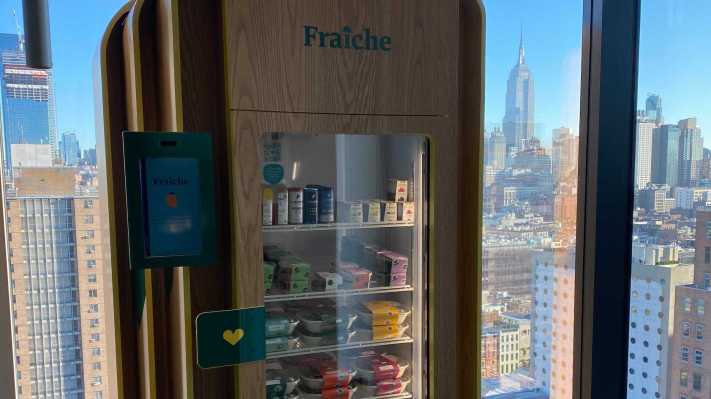As companies get employees back into offices, startups like New York-based foodtech company Fraîche aims to be the brand feature that welcomes them back.
Today, the company, founded in 2019, announced $2 million in seed funding by backers that included La Boulange’s Pascal Rigo, Petrus Winery’s Jean Moueix, Bakerly’s Bruno and Julien Caron and the Newlab.

Fraîche’s mobile app
Fraîche (pronounced like crème fraîche), aims to bring healthier food items into workplaces. It places an auto-stocking smart fridge inside offices and teams up with eateries, like Le Botaniste, Egg Shop, Pressed, La Fermiere to provide the food. It will also offer its own private label products in the future, Tximista Lizarazu, CEO at Fraîche, told TechCrunch.
All companies have to do is determine how much they want to subsidize per employee, and Fraîche will stock and refill the fridge everyday. Employees can also download an app to access the fridge’s contents.
One of Fraîche’s early investors, Romain Afflelou, co-founder of Cosmo Connected, said he liked the momentum that the company had and how it was leveraging that companies are ready to spend more money on their employees. He typically invests in companies that are connected with the world of tomorrow in terms of how people move, eat and heal.
“Fraîche provides all of the food options at the office, and employees can get more affordable food that is fresh and cleaner,” he added. “You can have meals Monday through Friday inside the same place and get different products each day.”
Meanwhile, many office cafeterias shut down during the global pandemic and were unable to staff up when they could reopen, Lizarazu said. Even his own company was not immune to the effects: Fraîche initially lost all of its locations, but saw the tides turn about four months later.
As a result, you might think that with the Omicron variant keeping people at home a little longer, something like Fraîche would not work. However, when asked, Lizarazu said the company just needs to have 30 people in an office to make what they do work. And, if 15% to 20% of offices don’t return ever, he is still optimistic with 80% of the market remaining, he added.
“Companies want to make their offices a better place, want to convince people to come back, and have more of a budget for health and wellness,” Lizarazu said. “Right now the market is shifting, and we are starting to sell more and move faster. We spent 2020 investing in technology and building the product, and now we are ready to deploy it.”
Though the company has only been operating for a few months, it is already seeing customers using the fridges three to four times a day to get meals and snacks. Lizarazu forecasted that companies would spend $5,000 a month, but is seeing double that.
Fraîche’s revenue is between $80,000 and $150,000 per machine per year, which includes servicing of the fridge and the food delivery, which he says is equivalent to what New Yorkers currently pay to order out for food and have it delivered, but in case, with less of the friction.
The latest round of funding gives the company $3 million in total funding. Workplaces including Tikehau Capital, Silverstein Properties, Newlab, Brooklyn Navy Yard, Ardian and Ogury are using Fraîche, and Lizarazu notes three more will open in January.
He expects to use the funding to grow Fraîche’s footprint in New York and to grow its team of eight employees, particularly in sales and marketing. He is hiring two sales reps and plans to have 20 employees overall by the third quarter of 2022. Fraîche has already signed 10 locations since the summer with plans to deploy into 30 locations in the next nine months and then grow to 100 locations by the end of 2023.
“It’s now a question of visibility,” Lizarazu said. “As long as our salespeople are talking to the right customers, we see the market is ready, and offices are really excited about what we are doing.”
